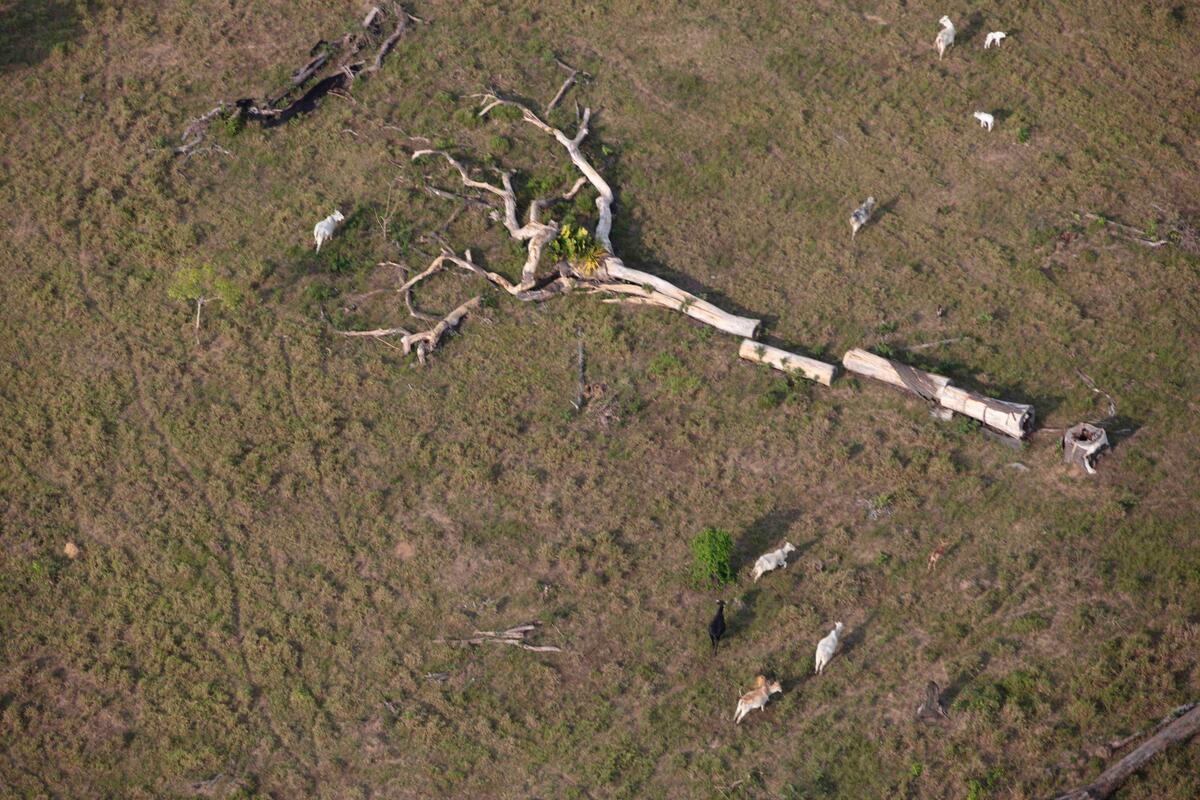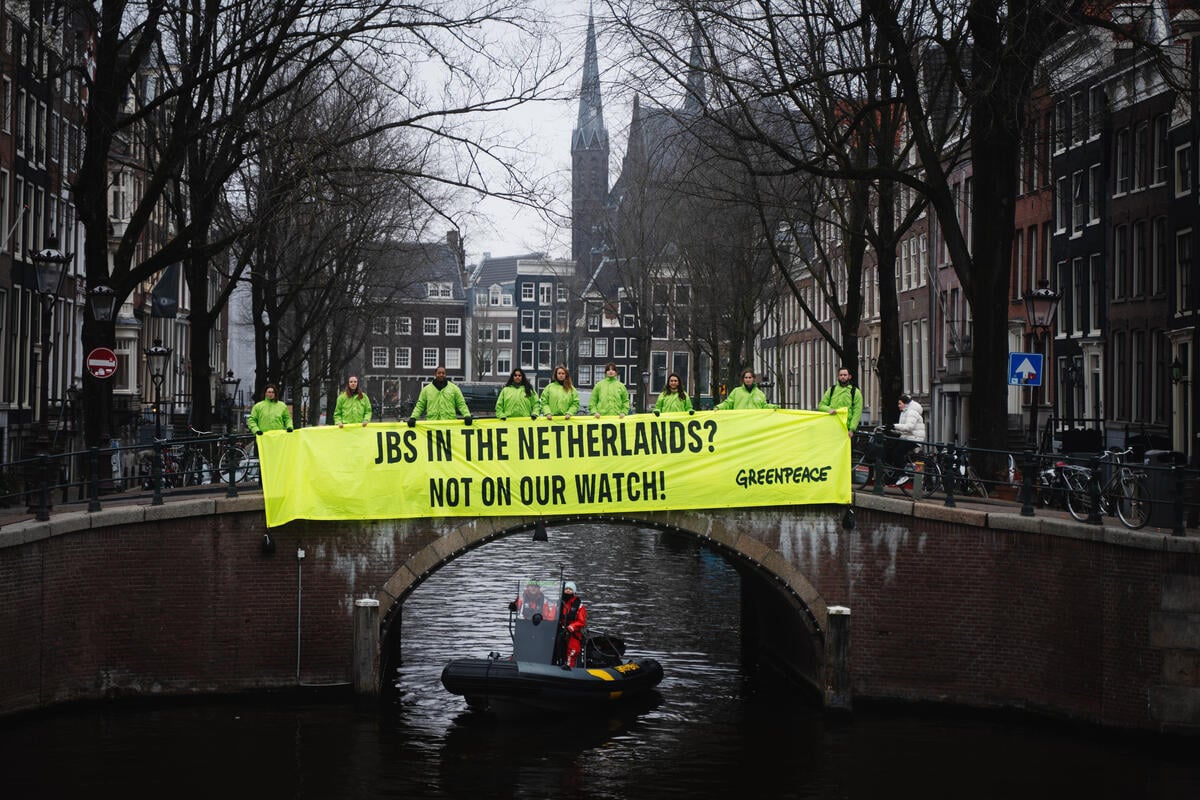The lawyers at Greenpeace International are a creative, dedicated team who tackle a wide range of duties. Part of our work is preparing legal strategies and defence for cases against Greenpeace International. We also monitor legal cases in which other Greenpeace organisations worldwide are involved. As a member of this team it gives me a unique, bird’s eye view on what appears to be a growing and pervasive trend globally: SLAPP suits.
SLAPP is an acronym for Strategic Litigation Against Public Participation. It is a lawsuit intended to scare critics into silence with excessively high damage claims and by burdening them with – often astronomical – legal defence costs.
In India, peaceful activists scaled Essar House Ltd’s headquarters in Mahalakshmi. They unfurled a large banner with the message “Essar kills forests”, protesting the plan to build a coal mine in the Mahan forests. The mine threatens a valuable, lush forested area and wildlife corridor. It also provides for the livelihoods of the local indigenous communities.
Essar dragged Greenpeace India into court instead of having an open and public debate about Essar’s responsibility for destroying the forest, forging documents and putting pressure on local communities. Essar requested a permanent injunction prohibiting further protests on or within 500m from Essar’s premises, a gag order and INR 500 crore – approximately 60 million Euros – for an alleged damage to their reputation. Pending a hearing where Greenpeace India will provide evidence to substantiate its statements, a Bombay judge granted a temporary injunction on further protests and a gag order. But this hasn’t stopped Greenpeace India from exposing the truth.
It hasn’t stopped Essar’s scare tactics either; in April the company filed another request for a permanent injunction and gag order, claiming that Greenpeace India interfered with the work on site of the Mahan coalmine project as well as allegedly threatening workers (with use of violence). However, 48 hours after a peaceful protest by the local communities at the Mahan site it was four activists who were arrested in the middle of the night, thrown in prison and charged with serious offences. Three of the four detainees have now been released on bail, but one person is still in detention.
Essar is not the only company trying to silence criticism about their operations with such tactics. In Canada Resolute Forests Products is pursuing a 7 million Canadian dollar – approximately 4.5 million euros – claim for defamation against Greenpeace Canada and two campaigners personally. This was after Greenpeace Canada published a report critical of Resolute’s destructive operations in the Boreal Forest and the company’s impact on endangered woodland caribou and Indigenous communities’ rights. Concerns over SLAPP suits in 2010 led to this submission by Greenpeace Canada to the Advisory Panel on Anti-SLAPP legislation.
It is not just deep-pocketed corporations abusing their financial power to stifle legitimate criticism – governments can more often be seen lashing out against activists.
In 2013, a peaceful protest at the “Prirazlomnaya” oil rig against Gazprom’s plans to drill offshore for Arctic oil was met with an incredibly aggressive and violent response by Russian authorities. The Greenpeace ship “Arctic Sunrise” was boarded by masked, armed men and all of her crew was detained. After being towed to Murmansk all 28 crew, a freelance photographer and a freelance videographer – by then known as the “Arctic 30” – were ludicrously charged with piracy and later hooliganism, both of which carry potentially substantial prison sentences. The Arctic 30 are now seeking justice at the European Court of Human Rights.
And just last month, Mexican activist, Rosina González climbed the headquarters of PEMEX, the state-owned oil company, in Veracruz, Mexico. At PEMEX’s instigation she is being investigated for breaking a light and charged with a crime that could send Rosina to prison for up to ten years. After a major public outcry the charge was quickly changed from intentionally into accidentally causing damage, which still carries a maximum 2-year prison sentence.
Fortunately, it is not all bad news.
In another Indian case, a request by Tata Sons Ltd. for a takedown order of a Pac-Man style game using Tata’s logo was flat-out denied. In summary proceedings the judge ruled that the game was not a clear-cut case of defamation and an order to take it down would be a violation to the right to freedom of expression. However, Tata is still pursuing a INR 10 crore – approximately 1.6 million Euros – claim for alleged damage to its reputation.
In 2012, after an early morning protest against Shell’s reckless plans to drill for oil in the Arctic, Greenpeace Netherlands and Greenpeace International were summoned in court that same afternoon, after receiving Shell’s 100 page legal complaint a mere 2 hours before. Based on this protest, as well as the earlier occupation of their boardroom by the Greenpeace Netherlands Executive Director, Sylvia Borren, Shell requested an injunction which would permanently ban protests by Greenpeace or its sympathisers within 500m of all Shell properties worldwide, with an automatic penalty of 1 million Euros per breach. However, the President of the Amsterdam Court made short work of Shell’s request. He made it very clear that if companies undertake activities that are controversial, these companies should expect and tolerate public criticism and protest, even if this may cause nuisance or some damage to them.
These are just a few of many examples and they are affecting ‘environmental human rights defenders’ more and more. Greenpeace International is working to seek greater protections for environmental human rights defenders. Threats to them are also threats to our planet. Governments need to protect environmental activists who are fighting for the right to a clean and healthy environment for all of us.
SLAPPs have a significant chilling effect on public debate and thereby on democratic society as a whole. Moreover, SLAPPs have become such a worrying trend that in many states in the US and Canada are taking steps to introduce anti-SLAPP legislation.
In spite of the ever-growing legal defence costs, we need to keep defending ourselves against such ludicrous claims, because we cannot allow ourselves to be silenced.
So, what can you do? You can urge your legislators to push for the adoption of anti-SLAPP legislation and stop these types of cases in their tracks.
Karianne Bruning is the Legal Co-ordinator for Campaigns and Actions at Greenpeace International.



